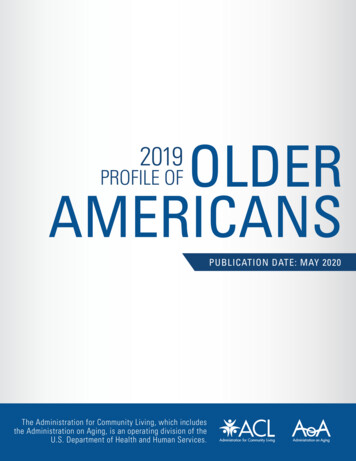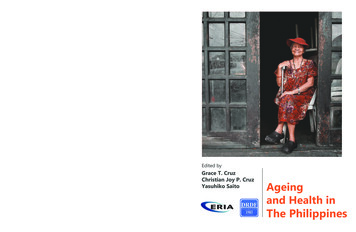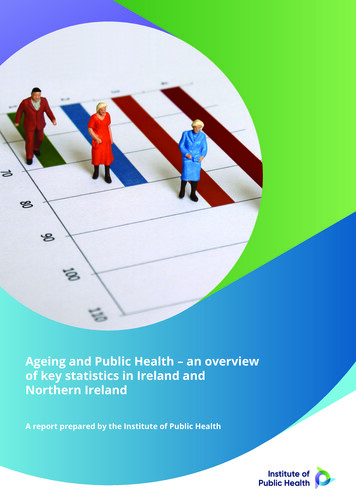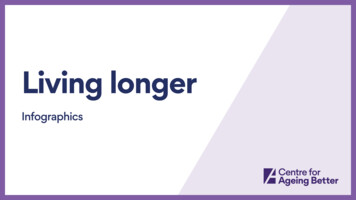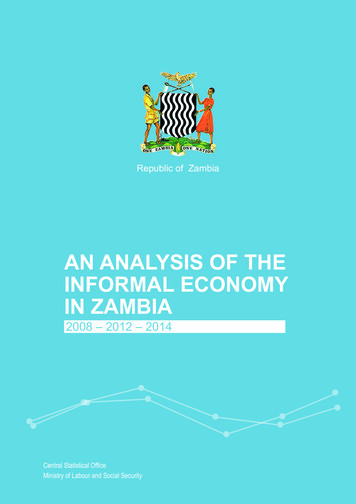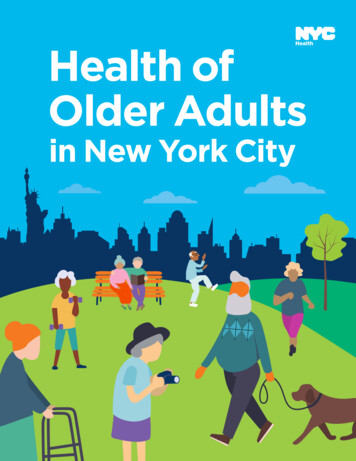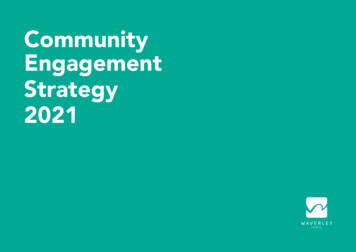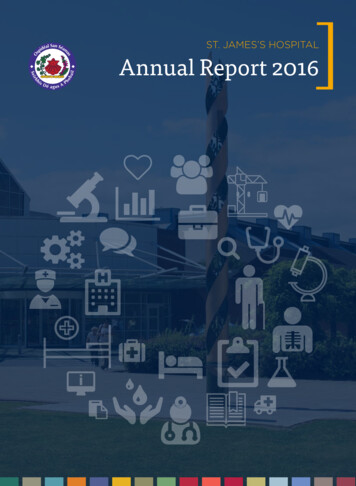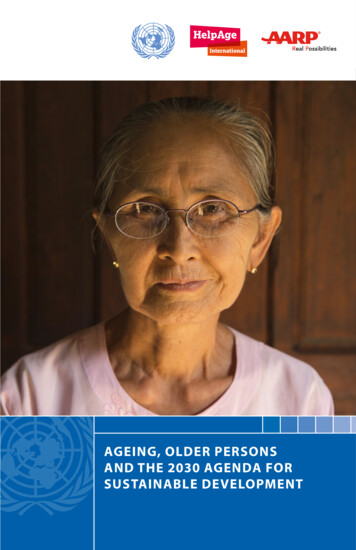
Transcription
AGEING, OLDER PERSONSAND THE 2030 AGENDA FORSUSTAINABLE DEVELOPMENT
ACKNOWLEDGEMENTSThis issues brief was written by Esuna Dugarova (UNDP) under the supervisionof Rosemary Kalapurakal with inputs from Pedro Conceição and Balazs Horvath (UNDP); Rosemary Lane, Karoline Schmid, Amal Rafeh and Lisa Ainbinder (UNDESA); Michael Herrmann (UNFPA); Silke Staab (UN Women); Katja Hujo(UNRISD); John Beard (WHO); Xenia Scheil-Adlung (ILO); Alex Warren-Rodriguez(UNDOCO); Tessy Aura (UN-Habitat); colleagues from HelpAge International andAARP; and Sylvia Beales Gelber (Independent Consultant) who prepared aninternal UNDP position paper on ageing.DISCLAIMERThe views presented in this publication are those of the author(s) and do notnecessarily represent those of the United Nations, including its affiliated organizations or its Member States, HelpAge International and AARP.
TABLE OF CONTENTSSECTION 1The 2030 Agenda for Sustainable Development and Older Persons 7SECTION 2Population Ageing: Evidence 8SECTION 3Why Ageing and Older Persons Matter for Development 11SECTION 4Ageing Challenges 14SECTION 5Policy Implications for the 2030 Agenda 17Notes 21References 24
Ageing, Older Persons and the 2030 Agenda for Sustainable Development UN - Sebastiao Barbosa6
Ageing, Older Persons and the 2030 Agenda for Sustainable DevelopmentSECTION 1The 2030 Agenda forSustainable Developmentand Older PersonsThe 2030 Agenda for Sustainable Development sets out a universal plan ofaction to achieve sustainable development in a balanced manner and seeksto realize the human rights of all people. It calls for leaving no one behindand for ensuring that the Sustainable Development Goals (SDGs) are metfor all segments of society, at all ages, with a particular focus on the mostvulnerable—including older persons.1Preparing for an ageing population is vital to the achievement of the integrated 2030 Agenda, with ageing cutting across the goals on poverty eradication, good health, gender equality, economic growth and decent work,reduced inequalities and sustainable cities. Therefore, while it is essentialto address the exclusion and vulnerability of—and intersectional discrimination against—many older persons in the implementation of the newagenda, it is even more important to go beyond treating older persons as avulnerable group. Older persons must be recognized as the active agents ofsocietal development in order to achieve truly transformative, inclusive andsustainable development outcomes.The current brief acknowledges the importance of a life-course approachto ageing and calls for protecting and promoting the rights of older persons in the implementation of the 2030 Agenda.7
Ageing, Older Persons and the 2030 Agenda for Sustainable DevelopmentSECTION 2Population Ageing:EvidencePopulation ageing is a major global trend that affects all countries, albeitat a different pace and levels (Dugarova and Gülasan 2017; World BankGroup 2016),2 and reflects significant achievements of human development such as improved health, greater longevity and lower mortality (UN2017; UNDESA 2007).In 2015, there were 901 million people aged 60 or over, comprising 12.3percent of the global population (UNDESA 2015a). While the Asia-Pacific region has the world’s largest number of people aged 60 or over (508million), Europe has the largest percentage of population of this age (24percent, or 177 million). Although Africa is home to a relatively smallnumber of older persons, it is projected to increase from 64 million to 105million by 2030. In fact, as public health gains advance in most countries,global life expectancy will continue to increase, contributing to a rise in thenumber and proportion of older persons in all parts of the world. Between2015 and 2030, the number of people aged 60 years or over is projectedto grow by 56 percent, reaching 1.4 billion in 2030, which will be nearly16.5 percent of the global population. By 2030, older persons are expectedto account for over 25 percent of the population in Europe and NorthernAmerica, 17 percent in Asia and in Latin America and the Caribbean, and6 percent in Africa. At the same time, what matters here is not only thegrowing number of older persons but also the heterogeneous and complexnature of ageing in view of older persons’ health, family and socio-economic status, among others.An important dimension in population ageing is gender (UN 2017; UNDP2016; UN Women 2015a). On average, women tend to outlive men, thuscomprising a majority of older persons. In 2015, women accounted for 548
Ageing, Older Persons and the 2030 Agenda for Sustainable DevelopmentFigure 1The growing share of the population aged 60 yearsor over in all world’s 00019800Northern AmericaEurope205030No1990Percentage of older persons aged 80years or over35Wo302040Percentage of older persons aged 80years or over35Oceania2015Northern AmericaLatin America andthe 0200019902050204020302020percent of the global population aged 60 years or over and 61 percent ofthose aged 80 years or over (UNDESA 2015a). At the same time, olderwomen tend to be more marginalized and disadvantaged than older men,with evidence showing higher rates of poverty among older women inboth developed and developing countries.3 Discrimination on the groundsof age and gender is still widespread around the world (UNDESA 2015b;UNFPA and HelpAge International 2012).4 Inequalities in income, accessto education, decent work as well as health across the life cycle accumulateand expose many women to poverty in old age, which is further exacerbated by lack of access to or limitations on social security entitlements, andin some cultures, lack of control over financial resources and denial of theright to own and inherit property.5 In addition, prevailing gender normsand the fact that women tend to outlive the men they marry or cohabitwith, mean that they provide the bulk of unpaid care for ageing spouses.201019802000Africa2050Latin America andthe CaribbeanAsiaSource: UNDESA (2015a)0204059
Ageing, Older Persons and the 2030 Agenda for Sustainable Development HelpAge International - KyMalik Alymkulov10
Ageing, Older Persons and the 2030 Agenda for Sustainable DevelopmentSECTION 3Why Ageing and Older PersonsMatter for DevelopmentPopulation ageing provides significant opportunities for sustainable development which are associated with the active participation of older generations in the economy, labour market and society at large. In view of theirexperience, knowledge and skills, older persons are important actors incommunities, making key contributions in the following interrelated areas:—— Economic development: Older persons make substantial contributions to the economy through participation in the formal or informalworkforce (often beyond retirement age), taxes and consumption,and transfers of assets and resources to their families and communities,6 and their broader retention in the workforce (among thosewho wish or need to continue working) has the potential to enhancelabour productivity.7 Today more older persons are contributingto an entrepreneurial ecosystem (Lee 2017), while embracing newtechnologies,8 by providing services through digital platforms, car oraccommodation sharing and peer-to-peer lending. In the contextsaffected by absence of breadwinners, migration, disease outbreaks andconflicts, older persons’ work can be the only source of monetary orin-kind income to sustain families.—— Unpaid care work: Older persons, particularly older women, play avital role in providing unpaid care for spouses, grandchildren and other relatives, including those with disabilities (UNFPA and HelpAgeInternational 2012). Furthermore, with changes in family structures,the HIV/AIDS pandemic and growing migration, grandparentshave become central and indispensable to the well-being of families,9especially in the absence of public care and other social services.11
Ageing, Older Persons and the 2030 Agenda for Sustainable DevelopmentFigure 2A large proportion of older persons aged 60 or above areemployed in selected developing countries, but significantgender gaps exist8076% of older gladeshPhilippinesThailandVietnam0Note: Employment is defined as paid work or self-employment, including informal employment but not unpaid care and domestic work. Source: HelpAgeInternational (2016).—— Political participation: With variation across contexts, older personsin some countries, notably in advanced democracies, can carry significant weight which is mostly associated with the concentration of economic resources and a tradition of political participation (UNDESA2007). As older persons continue to constitute an ever-greater proportion of the total population, they have the potential to be moreinfluential in society. This can have important implications for social,economic and political outcomes in those countries (progressive butalso regressive), as older persons tend to vote in greater numbers thanyoung people (Goerres 2009), and are increasingly forming their ownassociations such as lobbying groups, political parties and grassrootsorganizations (UNFPA and HelpAge International).10—— Social capital: Many older persons tend to be actively involved incommunity and civic life through volunteering, governance of publicinstitutions, and participation in community-based institutions. Thiscan contribute to strengthening social capital in terms of facilitating12
Ageing, Older Persons and the 2030 Agenda for Sustainable Developmentcooperation and improving interactions within and between groupsbased on shared values, trust and solidarity (OECD 2007). Oldergenerations are also often the important sources of historical memoryand wisdom, guardians of culture, and repositories of social traditionsand rare knowledge and skills,11 which can critically complementthose of young people.With the growing proportion of older persons in the global population,there is greater acknowledgement of the importance of ageing and recognition of the rights of older persons, as evidenced by a number of international mechanisms and initiatives.12 Despite these efforts, however,older persons have not benefitted systematically from development gainsin all contexts, as they tend to be overlooked by development policy anddiscourse, and their needs and rights are often not sufficiently addressed(UNDP 2016; UNFPA and HelpAge International 2012). UNDP - Giacomo Pirozzi13
Ageing, Older Persons and the 2030 Agenda for Sustainable DevelopmentSECTION 4AgeingChallengesAlong with the opportunities and contributions that older women andmen present, ageing poses a number of challenges for governments, societyand older persons themselves, which require urgent policy responses, aswell as anticipatory policy measures to prepare countries for meeting thesechallenges.In many national settings, particularly those where the number of olderpersons is growing fast, population ageing has raised concerns about theability of countries to provide adequate social protection for older persons(ILO 2014).13 Population ageing together with the epidemiological transition and related lifestyle changes are among the major factors of the risingincidence and prevalence of non-communicable diseases. This increases thepressure on public health systems to adapt to meet the growing demandfor age-appropriate care, including long-term care, services and technologies for prevention, detection and treatment of diseases (WHO 2015).Furthermore, with increased population mobility and urbanization, as wellas fewer intergenerational households, the provision of household-basedsocial support is becoming more challenging (UN 2017).In addition, older persons themselves face multiple challenges that severelyrestrict their human rights and their contribution to society. Poverty—thatis characterized by income insecurity, malnutrition, poor health and lackof access to clean water and sanitation, as well as adequate housing—is amajor threat to the well-being of older persons. In later life, people reducetheir working hours or stop working because of retirement options, healthissues or family responsibilities. Reliance on pensions alone in old age isusually not sufficient to meet basic needs, particularly in developing countries where the benefits that older persons receive are very low or non-ex14
Ageing, Older Persons and the 2030 Agenda for Sustainable Developmentistent (HelpAge International 2016; ILO 2014). Furthermore, while olderpersons are especially affected by displacement caused by conflict and natural hazards due to reduced physical ability and limited mobility, they areoften ignored in humanitarian interventions, placing great risk on theirability to survive and recover (HelpAge International and IDMC 2012).Another persistent challenge is ageism—prejudice and discriminationtowards older persons at individual and institutional levels—that undermines older persons’ status as rights holders including their right to autonomy, participation, access to education and training, health and social care,security and decent employment. Moreover, old age aggravates existingdisadvantages that individuals struggle with throughout their lives on thebasis of gender, race, ethnicity, disability, religion or other factors.Abuse of older women and men—physical, emotional or financial—hasnow been acknowledged as a growing concern for all countries, regardless of their level of development (UN 2012; WHO 2016). Despite thisrecognition, violence, neglect and abuse in old age have received modestattention in policies and research. For example, most studies of violenceagainst women set an upper age limit for data collection at age 49 years,which stems from a traditional focus on women in reproductive age andoverlooks violence in older women’s lives.Gaps in data and statistics on older persons present another importantissue, which not only obscures the challenges older persons face, but alsorisks excluding them from basic services to which older women and menare entitled.15
UN - Kibae Park16
Ageing, Older Persons and the 2030 Agenda for Sustainable DevelopmentSECTION 5Policy Implicationsfor the 2030 AgendaAgeing is likely to have far-reaching implications for all sectors of society,including labour markets, financial and health systems; political participation; demand for goods and services; urban planning and infrastructuredevelopment; as well as family structures and intergenerational relations.To ensure progress towards implementing the SDGs, it is essential to prepare for the economic and social transformations associated with ageingand old age, and ensure that the necessary conditions are developed toenable older persons to lead self-determined, healthy and productive lives,and empower them to exercise their right to make decisions and choices inall areas that affect their lives.A fundamental policy and attitudinal shift on ageing and old age is therefore needed to reflect and promote the contributions of older persons tosociety. Instead of focusing on the negative aspects of ageing, public debatesand policies must promote older persons and their agency as a solution tomany development challenges. The process of reaching out to older persons and overcoming marginalization and intersectional discriminationrequires an integrated and multifaceted approach, including sensitizationof power structures, investing in public education, enforcement of anti-discrimination legislation and articulating in a compelling manner the gainsfor society if older persons are included in the development process.Ending poverty in old age will require an expansion of social protectionprovisions and benefits (ILO 2014), inclusion in the formal labour markets, broader opportunities based on older persons’ skills, knowledge andexperience, and acknowledging (and compensating for) the unpaid services provided by them. Significant efforts to promote decent work forall should be accompanied by measures to strengthen the ability of older17
Ageing, Older Persons and the 2030 Agenda for Sustainable DevelopmentFigure 3Correlation between greater public pension provisionand lower poverty levels in OECD countries100Korea, Rep. of90Poverty rate among older persons giumPortugalNew 01020304050SloveniaFinlandPolandSweden EstoniaIrelandFranceCzech Rep.Luxembourg607080Hungary90100Share of public transfers in older persons' incomes (%)Source: ILO (2014)persons to maintain an adequate standard of living independent of theirfamily status and labour market trajectories. Initiatives and investments toenable older persons to access services such as health, care, transport andhousing are also needed.As the proportion of the world’s population in the older ages continuesto increase, the need for improved information and analysis of populationageing is growing. Knowledge is essential to assist policymakers to define,formulate and evaluate goals and programmes, and to raise public awareness and support for required policy changes. Therefore, there is an urgentneed to bolster the collection, analysis and use of good quality data on ageand ageing to effectively evidence the equitable delivery of the SDGs.Population ageing requires urgent action. Recognition of older persons’agency and acknowledgement of their human rights call for establishingthe policies that not only address the issues related to the current popu18
Ageing, Older Persons and the 2030 Agenda for Sustainable Developmentlation of older persons but also anticipate the increase in numbers of thepresent generations as they age, across the life course.Through partnerships, research and initiatives, UN agencies can:—— Mainstream ageing issues in their programmes of work, while stressing the need to ensure that the rights of older persons, includingto income, health, education, security, voice and participation areaddressed;—— Adopt an explicit life-course approach in their research portfoliosthat is used to support guidance, programmes and projects, whileensuring that more attention is paid to the situation of older personsby programmes;—— Build in the intersection of ageing with other critical issues includingpoverty, health, gender, decent work, inequalities, disability, environment, governance and conflict;—— Enhance coordination and cooperation with global and regionalintergovernmental organizations, bi- and multi-lateral developmentpartners, international and national non-governmental organizations,the private sector, academia and other relevant stakeholders to develop sustainable partnerships and promote dignified ageing and issuesrelated to older persons, while building on existing good practicesin terms of global platforms, coalitions and agreements on sharedprogrammes of work;—— Support better collection, analysis, dissemination and use of age-disaggregated data; and advocate for the inclusion of data on ageing innational instruments, policies and reporting;—— Encourage national and local policy development and implementation to be human rights-based, age-sensitive and all-age-inclusive,with measurable indicators to track progress on the situation of olderpersons.With collective efforts, UN agencies, policymakers, civil society and otherstakeholders can support setting a new agenda of active and healthy ageingthat can reduce the vulnerabilities and enhance the rights, capabilities andresilience of older persons, and thus fulfil the pledge of the 2030 Agendato leave no one behind.19
Ageing, Older Persons and the 2030 Agenda for Sustainable Development20
Ageing, Older Persons and the 2030 Agenda for Sustainable DevelopmentNOTES1The concept of “old age” is multidimensional, which includes chronological (based ona birthdate), biological (related to human body ability), psychological (concerned withpsycho-emotional functioning) and social age (related to social roles such as grandparents). This brief adopts the definition of the United Nations that uses 60 years or overto refer to older persons, while recognizing the diversity of older persons in terms oftheir needs, capabilities, lifestyles, experiences and preferences that are shaped by theirage, gender, health, income, education, ethnicity and other factors.2Population ageing takes place alongside other megatrends such as persistent poverty,rising inequalities within countries, climate change, conflicts and migration (Dugarovaand Gülasan 2017), which affects the conditions under which people age, their abilityto contribute, as well as their vulnerabilities.3Higher poverty rates among older women can be explained by lower rates of labourmarket participation, lower average earnings, higher incidence in informal employment, lack of social protection and unpaid domestic labour (ILO 2014; UN 2007;UNFPA and HelpAge International 2012). These factors are often magnified by thedesign of pension systems which require regular pay-roll contributions or include long‘vesting periods’ to be eligible for minimum pensions (UN Women 2015b).4Age-based discrimination has been found, for example, in relation to recruitment, retention and retraining of workers (UNFPA and HelpAge International 2012). A 2012survey of 26,500 older people across Europe showed that 21 percent had experiencedor witnessed discrimination at work because they were perceived as being too old (European Commission 2012).5In many developing countries, for example, statutory and customary laws continue torestrict women’s access to land and other assets, and women’s control over householdeconomic resources is limited (UNDESA 2015b). Furthermore, in almost a third ofdeveloping countries, laws do not guarantee the same inheritance rights for women andmen (ibid.), and in situations where, for instance, women survive their husbands, theymay not automatically inherit their spouses’ assets, if there are any, due to discriminatory legal practices (CEDAW 2015).6To encourage individuals to remain economically active into old age, many developedcountries have been increasing the age of retirement (UNDESA 2009). In developing21
Ageing, Older Persons and the 2030 Agenda for Sustainable Developmentcountries, a large proportion of older persons continue working into old age, as theydo not have access to social security systems and it is often the only way to makeends meet, sometimes despite ill health (HelpAge International 2016). To promoteolder persons’ employment, a number of countries eliminated age barriers through ageanti-discrimination legislation, introduced various programmes such as senior talentmarkets and universities of the third age, and carried out measures such as educationand training, career counselling, job creation and flexible working schemes (UN 2017;UNFPA and HelpAge International 2012).7Empirical evidence suggests that an older workforce in Sweden was compatible withrapid increases in productivity (Malmberg et al. 2008). Furthermore, in the UnitedKingdom, the contributions of older persons through taxation, consumer spending andother economically valuable activities such as social care provision and volunteeringwere estimated to be worth nearly GBP 40 billion in 2010, which is more than expenditure on them through pensions, welfare and health care combined, and this number isset to rise to GBP 77 billion by 2030 (Cook 2011). In most sub-Saharan African countries, older persons constitute a substantial proportion of smallholder farmers, whichmakes them critical for ensuring food security (Aboderin and Beard 2015).8In the United Kingdom, for example, 45 percent of 55-75 year-olds were reportedto spend up to 30 hours per week online and 47 percent communicated via Skype orinstant messenger services, while in the Turkana region of Kenya, older persons usednew technology to receive cash transfers through the Hunger Safety Net Programme(UNFPA and HelpAge International 2012).9For example, studies show that 69 percent of Bolivian migrants who moved to Spainleft their children at home, usually with grandparents; in rural China, grandparentslook after 38 percent of small children whose parents had gone to cities for work; andin some parts of Colombia, around a third of internally displaced older persons wereresponsible for caring for grandchildren (UNFPA and HelpAge International 2012).10In developing contexts, these associations also allow members to access microcredit,health services, business loans and job training, while creating social support networks(UNFPA and HelpAge International 2012).11For example, older persons in rural areas often have expertise in farming practices andknow how to cope with environmental shocks and food shortages, which can be vitalfor rural communities to survive in times of crisis (UNFPA and HelpAge International2012).12The major ones include the 1982 Vienna International Plan of Action, the 1991 UNPrinciples for Older Persons, the 1994 International Conference on Population and22
Ageing, Older Persons and the 2030 Agenda for Sustainable DevelopmentDevelopment Programme of Action, the 1999 UN International Year of Older Persons, the 2002 Madrid International Plan of Action on Ageing (MIPAA), the establishment of the Open-Ended Working Group on Ageing in 2010, and the creation ofthe Independent Expert on the Enjoyment of All Human Rights by Older Persons in2013.13Extending pension systems has proved critical in assuring income security in older age,as part of a wider effort to extend social protection and reduce poverty among olderpeople (ILO 2014; UNFPA and HelpAge International 2012). However, in many developing countries only a small proportion of the older population is covered by old-agepensions mainly due to the informality of the labour market (ibid). The situation ofolder people in developing contexts is further undermined by the fact that there are fewresources to distribute (Herrmann 2015).23
Ageing, Older Persons and the 2030 Agenda for Sustainable DevelopmentREFERENCESAboderin I. and J. Beard 2015. “Older people’s health in sub-Saharan Africa.” Lancet, 385(9968): 9-11.CEDAW (Convention on the Elimination of All Forms of Discrimination againstWomen). 2015. Women’s Property and Inheritance Rights in Tanzania. Communication No. 48/2013. CEDAW/C/60/D/48/2013.Cook J. 2011. “The socioeconomic contribution of older people in the UK.” Working Older People, 15(4): 141-146.Dugarova, E. and N. Gülasan. 2017. Global Trends: Challenges and Opportunities inthe Implementation of the Sustainable Development Goals. Joint report by the UnitedNations Development Programme and the United Nations Research Institute forSocial Development. New York: UNDP and Geneva: UNRISD.European Commission. 2012. Active ageing UK factsheet. Special Eurobarometer,No. 378. Brussels.Goerres, A. 2009. The Political Participation of Older People in Europe: The Greying ofOur Democracies. London: Palgrave Macmillan.HelpAge International. 2016. Work, family and social protection: Old age income security in Bangladesh, Nepal, the Philippines, Thailand and Vietnam. HelpAge International, East Asia/Pacific Regional Office.———. 2015. Global AgeWatch Index 2015: Insight Report. London: HelpAgeInternational.HelpAge International and IDMC (Internal Displacement Monitoring Centre).2012. The neglected generation: The impact of displacement on older people. HelpAgeInternational and IDMC.Herrmann, M. ed. 2015. Consequential omissions. How demography shapes development – Lessons from the MDGs for the SDGs. Berlin: Berlin Institute for Populationand Development.24
Ageing, Older Persons and the 2030 Agenda for Sustainable DevelopmentILO (International Labour Organization). 2014. World Social Protection Report2014/15: Building economic recovery, inclusive development and social justice. Geneva:ILO.Lee, J. 2017. Beyond Millennials: Valuing Older Adults’ Participation in InnovationDistrict. Washington, DC: Brookings Institution.Malmberg, B., Lindh, T. and M. Halvarsson. 2008. “Productivity consequencesof workforce aging: stagnation or Horndal effect?” Population and DevelopmentReview, 34: 238-256.OECD (Organisation for Economic Co-operation and Development). 2007.Human Capital: How What You Know Shapes Your Life. Paris: OECD.UN (United Nations). 2017. Monitoring of population programmes, focusing onchanging population age structures and sustainable development, in the context of the fullimplementation of the Programme of Action of the International Conference on Population and Development Report of the Secretary-General. E/CN.9/2017/3. New York:United Nations.———. 2012. Second review and appraisal of the Madrid International Plan of Actionon Ageing, 2002. Report of the Secretary-General. E/CN.5/2013/6. New York: United Nations.UNDESA (United Nations Department of Economic and Social Affairs). 2015a.World population ageing 2015. ST/ESA/SER.A/390. New York: United Nations.———. 2015b. The World’s Women 2015: Trends and Statistics. New York: Unit
8 Ageing, Older Persons and the 2030 Agenda for Sustainable Development Population ageing is a major global trend that affects all countries, albeit


